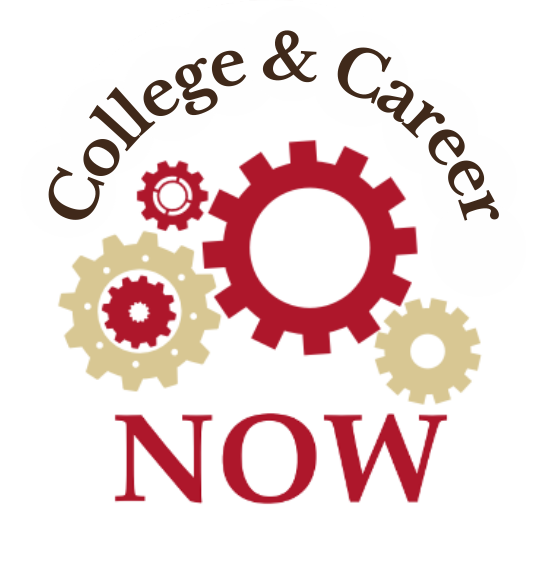
Got College and Career Information? It’s Complicated!
By Dr. Laura Owen
Executive Director Center for Equity and Postsecondary Attainment
We know that access to the best information influences students’ college decisions. Yet, Black, Brown, and Indigenous students, and those residing in low-income homes or who are the first in their family to attend college experience the cradle to career pipeline differently. Lacking access to pertinent material and key sources of support to make informed decisions about whether and how to pursue a college degree, they must fend for themselves and sort through an endless amount of data and discordant information.
School counselors have long been viewed as pivotal actors in supporting students as they make the transition from high school to college or career, however what that looks like varies significantly from high school to high school. With over more than 1.7 million students attending schools with police but no school counselor and school counselor to student ratios and job expectations varying widely, how are students sorting through the complex array of information? Researchers Laura Owen (San Diego State University), Tim Poynton (University of Massachusetts-Boston) and Raeal Moore (ACT) partnered to better understand students’ sources of college and career information and the most effective communication method for receiving this information. The entire study and its findings can be found in the Journal of College Access.
Sources of Support: People
According to the survey findings, school counselors and college admissions counselors are the most preferred source (65% prefer HS counselor; 63% prefer admissions counselors) for college and career information. Students who prefer to receive college and career information from their school counselor describe their school counselor as the most knowledgeable and best positioned to share accurate and personalized information regarding college and career opportunities.
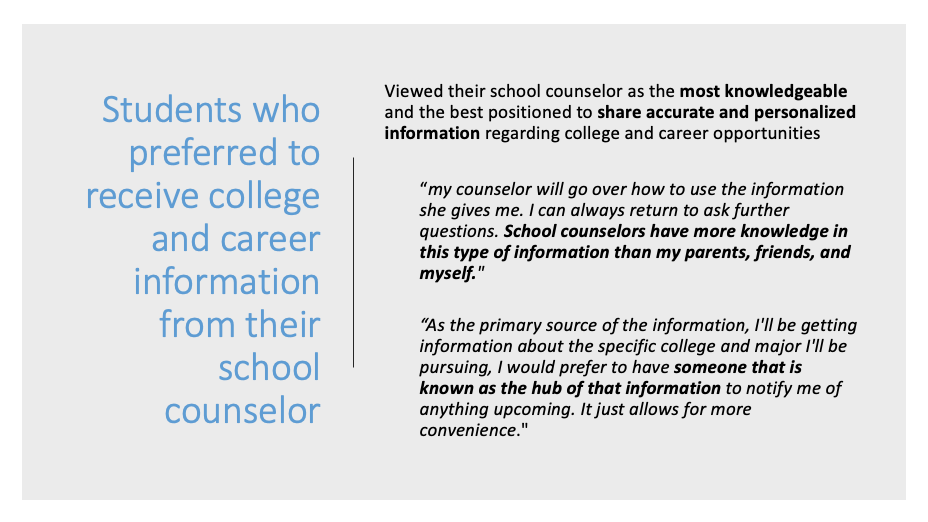
Students also expressed that the amount of information available to them was completely overwhelming and they expect their school counselor will help them sort through all of it. Students who ranked their school counselor as the most preferred source of college and career information also viewed their school counselor as the most knowledgeable and trusted that the school counselor had their best interest in mind. However, students also shared concerns about the lack of access to their school counselor, often when they need them the most.
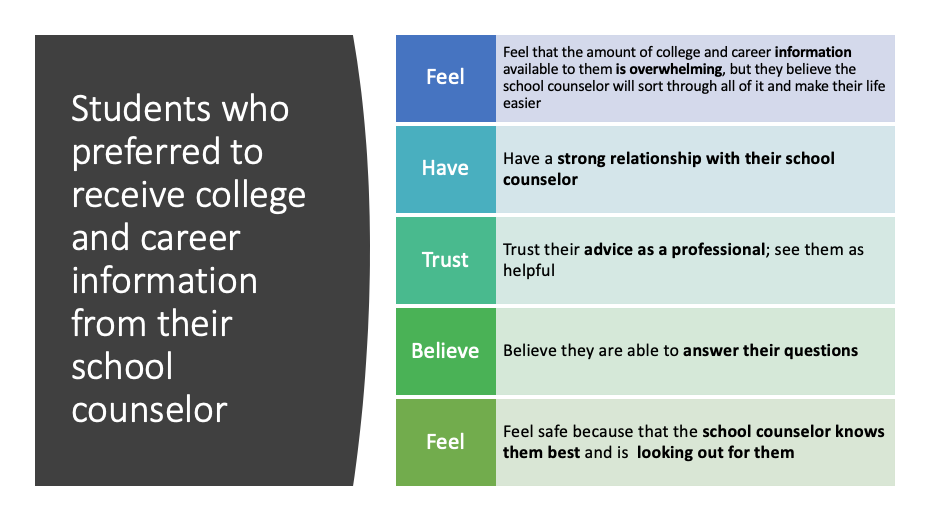
Students who prefer to receive college and career information from someone other than their school counselor also trust their advice and believe they have the students’ best interest in mind.
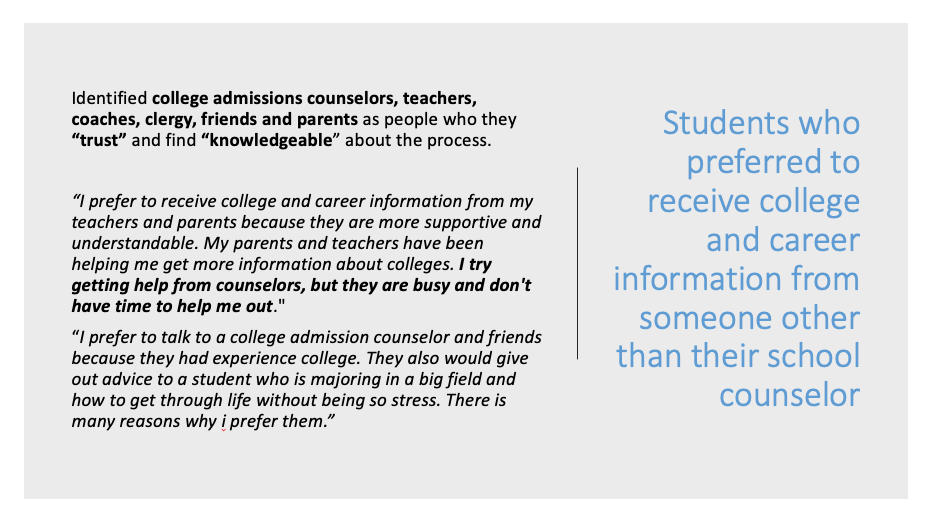
Regardless of who students identified as their preferred source of information, they perceive this person to be the most knowledgeable provider of college advice and they see them as an expert who they can trust.
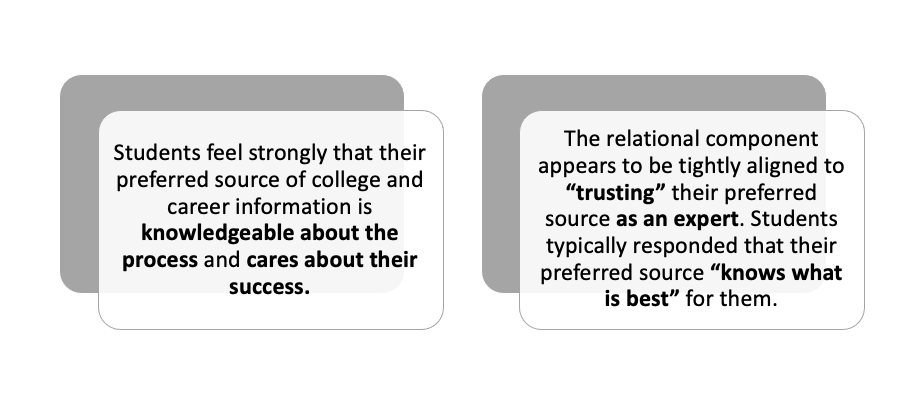
Having a trusted adult to rely on for postsecondary guidance is essential, however assuming that anyone can provide this support or that all college and career advice is equal is not only misguided, it’s dangerous. Researchers, practitioners, parents and students have long noted that the postsecondary counseling and advising system was never designed to serve all students. It is unacceptable to acknowledge these glaring problems, yet continue to sit back and watch it unfold, as if admitting the problem absolves us from finding solutions. Until we commit to reviewing and dismantling school policies and practices that lead to inequitable and decreased postsecondary opportunity, we are all just accomplices in holding up an advising and counseling system designed to support the most affluent, educated and predominantly White communities. What do we need to do differently?
- Hire diverse school counseling practitioners whose lived experiences align with, provide context and celebrate the communities, students and families they serve.
- School counselor training programs must recruit and train more Black, Brown and Indigenous school counselors and college and career advisors to fill these new positions.
- Improve the preparation of all professionals who provide college and career information. From pre-service training to professional development, the need for ongoing, equity centered training must be non-negotiable. School counselors should be allocated time to attend professional development that is directly aligned to college and career counseling – and professional development needs to be embedded into their jobs as it is for teachers and administrators.
- COVID-19 has exposed and exacerbated long standing systemic, structural and institutional educational inequities. We must be intentional in our pandemic recovery to dismantle these inequitable practices and replace them with interventions and practices that promote enrollment, persistence and completion for all students.
- New postsecondary advising and counseling models should challenge existing Eurocentric practices, elevate diverse perspectives, call out racist policies and practices and ensure substantive counseling and advising support is provided to disenfranchised families and students.
- Given the especially critical role school counselors play in helping students attending high minority, high poverty schools, professional development is not only needed to increase counseling skills and knowledge, but it is also requisite that all school counselors challenge the inequities built into the educational system, call out the policies and practices that perpetuate racism, ableism and other discriminatory practices and acknowledge their role in changing the deficit lens through which too many children are viewed.
Preferences for information and perceived helpfulness would most certainly shift if we embraced these changes. Currently, perceived helpfulness does not line up perfectly with student preferences for information. While students prefer to receive college and career information from their high school counselor, they do not find them to be the most helpful. This could be in part because students consistently mentioned how difficult it is to meet with their counselor. First generation students and students from low-income families ranked their school counselor as the most helpful source of information, however as parental income levels and postsecondary degree attainment increased, viewing school counselors as their preferred source of college and career information decreased in lock step fashion.
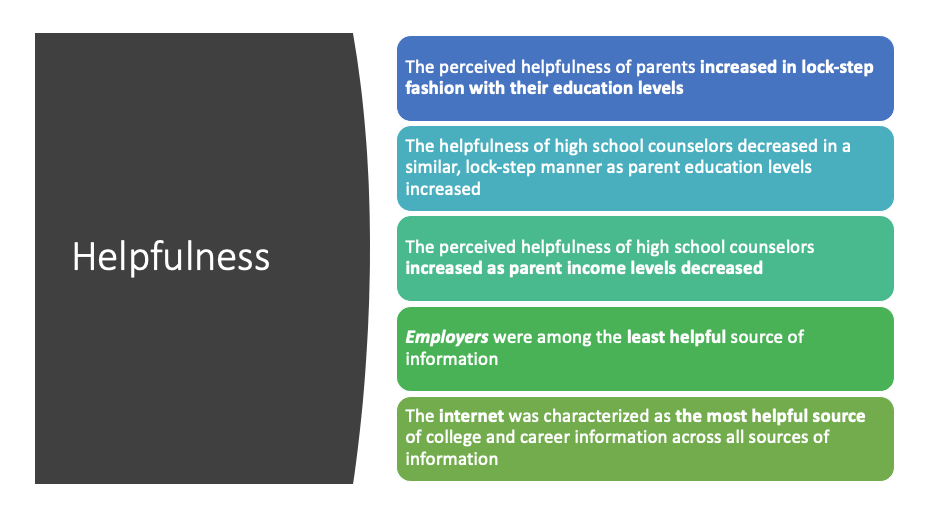
Media
Students indicated that the internet is their most helpful source of college and career information. Although information is readily available on the internet, it does not mean students have knowledge, access, or understanding of what is available or how to discriminate between accurate, helpful information versus harmful guidance on the internet. While the Internet was rated to be a helpful source of information, it was also among the least-preferred information sources, with interpersonal communication methods (email and one-on-one) being the most preferred. Students (and adults) need help determining which internet resources are useful, accurate and meet their needs.
Communication
Email and one on one conversations were the most preferred means of communicating college and career information (69% prefer email and 48% prefer one on one). This finding was replicated in another study and upon further conversation with the students, it was discovered that students were using email as a protective shield to help them sort out communication in which they did not want to engage in. This is somewhat alarming given the high rate of communication that higher education institutions send out through email. Many students miss key pieces of information because they are not opening their inboxes.
Understanding the ways in which students are engaging with technology is an important piece of the advising puzzle. We can educate college and career advising professionals on this common practice so they can begin to help students understand how email is used by higher ed institutions and why engaging with email to filter unwanted contact can cause problems that may potentially lead to the loss of key opportunities. Also, we may be seeing another manifestation of the role relationships play in their decision-making process. Students prefer one-on-one contact, which makes complete sense given the complex yet personal nature of navigating the postsecondary pipeline. They prefer to open email from someone they know, just as they engage in conversations with someone who they find as knowledgeable, trustworthy, and accurate. We need to ensure that we are building a system that provides access to knowledgeable and trustworthy college and career advising professionals, one that ensures support for all students especially those who have been discriminated against. We are all responsible for calling this out and demanding the college counseling changes that must happen now.
The findings of this study are useful for K‐12 education, college access, and higher education professionals to consider when developing policies and programs to provide college and career information to students.
*This blog is printed and posted in collaboration with ACT.org here.
